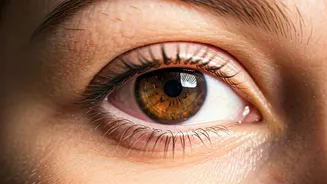Decoding Dark Circles
Dark circles, those unwelcome shadows under the eyes, are caused by a complex interplay of factors. The skin beneath the eyes is particularly thin and
delicate, making it susceptible to discoloration. The underlying blood vessels become more visible, leading to a bluish or purplish hue. Additionally, increased melanin production or pigmentation can also contribute to the darkening. Aging, which causes the skin to lose collagen and become thinner, can exacerbate the problem. Factors like genetics, lack of sleep, and lifestyle choices such as excessive alcohol consumption or smoking can also play a significant role in the appearance of dark circles. Understanding these root causes is the first step toward developing an effective treatment strategy. Furthermore, allergies and nasal congestion can also contribute, as they can cause blood vessels around the eyes to dilate and darken.
Preventing Dark Circles
Preventing dark circles involves a multifaceted approach that focuses on addressing the underlying causes. Getting adequate sleep is paramount, as sleep deprivation can lead to blood vessel dilation and increased visibility. Aim for 7-9 hours of quality sleep each night to allow your body to rest and repair. Protecting the delicate skin around your eyes from sun exposure is crucial, as UV rays can trigger excess melanin production and worsen pigmentation. Use a broad-spectrum sunscreen with an SPF of 30 or higher, and wear sunglasses when outdoors. Staying hydrated is essential for maintaining healthy skin, so drink plenty of water throughout the day. Reducing stress through relaxation techniques like yoga or meditation can also help, as stress can contribute to poor sleep and overall skin health. Managing allergies and avoiding irritants can minimize inflammation and blood vessel dilation. Adopting a healthy lifestyle, including a balanced diet and regular exercise, supports overall well-being and skin health.
Home Remedies to Try
Several readily available home remedies can help reduce the appearance of dark circles. Applying cold compresses, such as chilled cucumber slices or cold tea bags, can constrict blood vessels and reduce inflammation. Steep two black or green tea bags in hot water, let them cool, and then apply them to your closed eyes for 15-20 minutes. The caffeine in tea can help constrict blood vessels. Placing chilled cucumber slices on your eyes for about 15-20 minutes can also provide a soothing effect. Another effective remedy is the application of a mixture of almond oil and vitamin E oil. These oils hydrate the skin and help to reduce the appearance of dark circles. Additionally, applying a paste made from turmeric and pineapple juice can help to brighten the under-eye area due to the anti-inflammatory and skin-lightening properties of turmeric and pineapple. Remember to always perform a patch test before applying any new remedy to your skin to check for allergic reactions.
Skincare Tips for Brightening
Incorporating specific skincare products into your routine can effectively combat dark circles. Look for products containing ingredients like vitamin C, which is a potent antioxidant that brightens the skin and protects it from damage. Retinoids can increase cell turnover and reduce the appearance of fine lines and wrinkles, which often accompany dark circles. Products with hyaluronic acid can help hydrate the under-eye area, making it appear plumper and reducing the visibility of dark circles. Using an eye cream specifically formulated for dark circles is beneficial. Apply it gently using your ring finger, as this finger exerts the least pressure. Be gentle and avoid harsh rubbing, as this can further irritate the delicate skin. Consider using a concealer that matches your skin tone, to neutralize the darkness. Opt for a concealer with hydrating properties to prevent the skin from drying out.
Lifestyle and Diet
Making adjustments to your lifestyle and diet can play a significant role in reducing dark circles. Minimize your intake of alcohol and sodium, as both can lead to dehydration and fluid retention, which can worsen the appearance of dark circles. Ensure you're getting adequate sleep, as sleep deprivation is a common culprit. Manage stress through relaxation techniques or meditation, since stress can affect blood flow and skin health. Include foods rich in antioxidants, such as berries, leafy green vegetables, and nuts, in your diet. They can help protect against free radical damage and improve skin health. Hydrate your body properly by drinking plenty of water. Proper hydration can help maintain the elasticity of your skin, making it less prone to dark circles. Consider reducing or eliminating smoking, as it constricts blood vessels and deprives the skin of oxygen.













